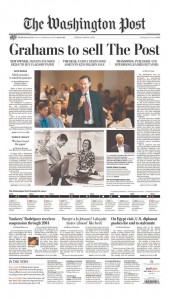 Out of the great family-owned newspapers, only the Sulzberger’s seem to remain standing, holding on tightly to the New York Times. On Monday, an 80-year history came to a close when the Grahams agreed to sell the Washington Post to Amazon founder Jeff Bezos for $250 million.
Out of the great family-owned newspapers, only the Sulzberger’s seem to remain standing, holding on tightly to the New York Times. On Monday, an 80-year history came to a close when the Grahams agreed to sell the Washington Post to Amazon founder Jeff Bezos for $250 million.
Unlike the Boston Globe, which has been on the chopping block for some time, the sale of the Washington Post was done so quietly that it was quite sudden. It may be hardly surprising when a newspaper is sold these days, but the Washington Post’s announcement left an impact. “This was a huge shock to the industry,” said David Coates, managing editor of newspaper content at Vocus Media Research Group. “The Washington Post is a staple of American journalism. This is the newspaper that took down a presidency. A Graham has been running the paper since FDR was in the White House. The Grahams are newspaper royalty.”
The sale of a major newspaper to a wealthy businessman has become a common theme. The Globe is being sold to Red Sox owner John Henry, while Warren Buffett has been swooping up papers around the country for some time now. And we can’t forget Freedom Communications, which was purchased by Eric Spitz and Aaron Kushner last year. While Spitz’s and Kushner’s focus has been on print, there’s a good chance that Bezos will have a more digital concentration. After all, Amazon has given the publishing industry a run for its money with e-books and the creation of Kindle. Publisher Katharine Weymouth said in a letter to employees: “Jeff knows as well as anyone the opportunities that come with revolutionary technology when we understand how to make the most of it. Under his ownership, we will be able to accelerate the pace and quality of innovation.”
But what does this trend toward media moguls mean? Coates noted it’s always about the bottom line. “ Newspapers are not a good investment and are depreciating in value. The Washington Post established its website in 1996 and said for the last 15 years it would always be free. Well in the last year the company decided it would use a paywall. Like most of the newspaper industry, the Washington Post did not anticipate the value of online and social media early enough to take advantage of it financially. Obviously, Jeff Bezos is an innovator with the development of Amazon, and maybe he has some ideas that will help bring the Post racing into the second decade of the 21st Century.”
The sale also included the Washington Post Company’s Fairfax County Times, El Tiempo Latino, Express, the Gazette Newspapers and Southern Maryland Newspapers. Slate, The Root and Kaplan division were not a part of the deal. Meanwhile, publisher Weymouth and editor Marty Baron will stay on with the paper, along with other senior staff.
As many have already written, an era seems to have come to an end. But new adventures are also on the horizon for the Washington Post, and it will be interesting to be witness to what Bezos will make of the storied newspaper. Meanwhile, one might wonder if the New York Times isn’t next. “If this happens to the Post, it definitely could happen to the New York Times, but I doubt it,” said Coates. “The New York Times would sell off everything it had (such as the Boston Globe) to save itself from being bought by a media mogul.” Only the future can tell.
–Katrina M. Mendolera![]()

